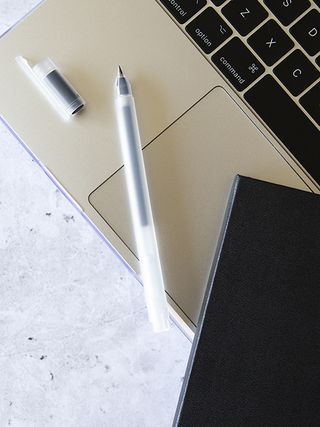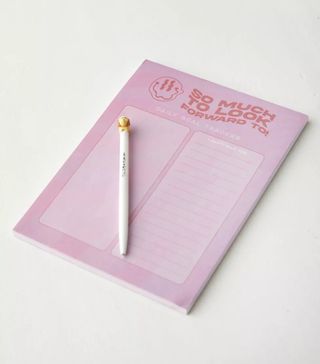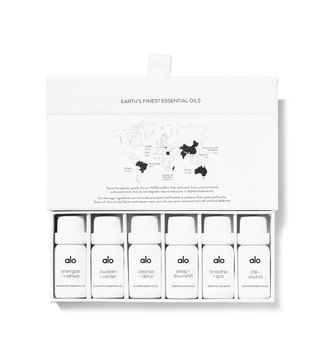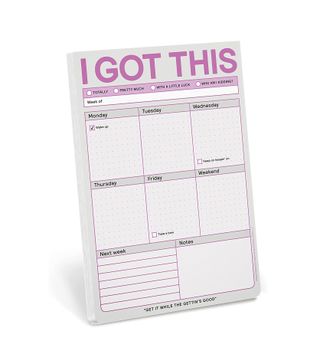15 Things to Do If You're Feeling Super Stressed at Work

When things get stressful at work, it can really affect all other parts of your life. I know for me, when I'm super busy or stressed out about projects, I can neglect things like eating healthy, working out, getting enough sleep—basically all the essential things for my well-being. It can really take a toll on my whole body and, of course, my mind. Stress at work can do a number on your mental health. Heck, hasn't almost everyone been discussing burnout and their experiences with it during these past few years? Burnout and stress at work are so real and can have some major consequences if you aren't able to get in control of it.
I know, I know: "Getting in control of it" is a lot easier said than done. Everyone has different work environments, life situations, etc. So how you're able to deal with it is very specific to your circumstance. But there are some ways to reset or cope that can work for just about any situation. One way to do that? Learning how to practice mindfulness at work.

No, I'm not talking about stopping to lead your whole office in a meditation. (Although, hey, maybe your employer would allow that.) I'm talking about a few things you can do throughout the day that can help you stop the stress and pressure from ruining your day (or week or month). Kristin Wilson, MA, LPC, CCTP, RYT, chief experience officer at Newport Healthcare, adds that mindfulness can provide stress reduction, self-control, and concentration improvement, and it can lead to an overall improvement in well-being.
So what exactly is it? Well, simply, it's being aware of your thoughts but not getting super worked up about them. "Mindfulness is a state of mind that is neutral, nonjudgmental, and observational," explains Mae Casanova, PsyD, a licensed clinical psychologist and Frame community therapist. "When we are coming from a place of mindfulness, we are able to observe our thoughts and feelings without judgment and without suppression. Mindfulness allows us to validate the thought, feeling, or experience that's coming up for us while not over-identifying with whatever unhelpful initial reaction we may have."
It also gives us the opportunity to find peace in even the most distressing of times and helps us find our centers, says Richard-Michael Calzada, LPC, of Connections Wellness Group. "It also allows us to remove unnecessary complications from our lives and defuse our everyday anxieties and uncertainties, he adds.
Peace in a stressful work environment? Well, sign me up for mindfulness, then. Casanova says it's essential to practice mindfulness at work. It can help us be aware of our initial emotional responses and be intentional with our behaviors. And it helps give us a different perspective, or a bird's-eye view, of the situation so we can limit how we're internalizing or personalizing situations. "For example, from a mindfulness state, when our boss sends an email that we interpret as passive-aggressive, we can manage our response to that email in a more emotionally settled way. Instead of, 'This is a passive-aggressive email,' it can just be 'an email.'"

Not only can practicing mindfulness at work help reduce the stress and pressure you might be feeling, but it could also have a positive impact on your interactions with co-workers. "Mindfulness is also excellent for navigating interpersonal conflicts," Calzada says. You can rewire your brain to notice and experience rather than react and stress out. With time, this rewiring process can and often does lead to improved conflict-resolution skills, decreased worry, and improved self-confidence. You can explain your situation to your colleagues in a neutral way rather than in a confrontational manner. Emotions, thoughts, and feelings still come up organically, and that experience often leads to greater inner peace. We could all use more of that."
And mindfulness can help in any type of work environment—even if you work from home. Casanova says it's especially important to practice mindfulness if you are working from home because the WFH experience doesn't always allow a distinction between the office and home. She recommends finding intentional times to practice mindfulness.
Now that you know about the benefits, you might be wondering how to get started. The experts shared tips on how to incorporate mindfulness into your workday below.
1. Set an Intention

Wilson suggests setting an intention at the beginning of the day as a way to practice mindfulness.
2. Practice Mindful Breathing

Calzada says he's practiced mindful breathing at work and has found it helpful. It's when you turn your attention fully to your breath without trying to change it. Then you notice where the breath feels clearest or most physically present within the body. It only takes a few minutes and can be done pretty discreetly, too.
3. Stop Before Responding to an Email

Casanova suggests taking five minutes before responding to an email. "Utilize these five minutes to take a few deep breaths to get your mind into a state of neutrality and to make sure that you are responding with intention instead of impulse," she says.
4. Take Meditation or Mindfulness Breaks

"These could be as simple as just closing your eyes and being present for a few minutes or listening to a mindfulness exercise," Wilson says.
5. Actually Take Breaks

It can be so easy to get caught up in your work and forget to take a break. Next thing you know, it's 4 p.m. and you haven't gotten up the whole day. But it's important to take those moments—it can help with stress or overwhelming feelings. "Use your breaks! When it's your lunch hour, actually take a break to eat lunch rather than eating and working," Wilson says. "Give yourself space and time to breathe and slow down. Draw boundaries for your mental health by truly signing off when the workday is done."
6. Get Up and Move

Do this every so often, Casanova suggests. "Moving our body and getting outside of the work environment, even just out of our desk area, can be helpful in clearing our mind and resetting our intentions," she says.
7. Focus on a Single Task

"While multitasking can make us feel like we're being more productive, when possible, try to concentrate on one project at a time to be most effective at that one thing—and to care for your mental wellness," Wilson says."
8. Practice Mindful Observation

Calzada recommends employing mindful observation, which is picking on a neutral item and focusing on it for five minutes, noticing how it feels, looks, smells, and sounds, and taking in as many sensory details as possible.
9. Do a Body Scan

You can also do a body scan to practice mindfulness. For this, Calzada recommends sitting in a comfortable position, closing one's eyes, and scanning with awareness from head to toe while noting any physical sensations as you're doing it.
10. Incorporate Sensory Stimulation

Stimulate those senses during the day. "For example, having an essential oil or particular scent that can initiate a feeling of calm is helpful," Casanova says. "Hold something cold—this can 'shock' our system back into the present moment. Listen to music you enjoy. Taste something you enjoy. Stimulating the five senses is a great and easy way to ground yourself at work."
11. Take Mental Notes

Caldaza also suggests taking mental notes. That involves "taking a comfortable seated position, setting a timer for five minutes, and writing down specific thoughts that arise, such as, 'I am thinking about what I want for lunch,' 'I am thinking about how I didn't get enough sleep last night.'"
12. Be More Purposeful

You may feel like you need to go a mile a minute, but sometimes it helps to slow down. You might avoid making mistakes and actually do better work this way. Wilson says you can practice mindful work by slowing down and being more purposeful.
13. Try Some Mindfulness Exercises

Casanova gives two mindfulness exercises to try:
Exercise #1: Notice the soles of your feet on the ground. Whether you're barefoot or not, notice the way the ground supports you as you push into it. Try it sitting, and try it standing. Notice the difference. This noticing can bring us back to the present moment and get us out of the busyness of our minds.
Exercise #2: Take three deep belly breaths. With one hand on your heart and one hand on your stomach, take a deep inhale that expands your belly as if you were blowing up a balloon. At the top of your inhale, exhale as if you were the air escaping through the tiny out point of that balloon.
14. Take a Step Back

"I also find it beneficial to practice taking a step back and affirming my own feelings and struggles," Caldaza says. "Sometimes the best reminder is, 'I am feeling stressed. I am not my stress.'"
15. Write Down Your Accomplishments

And don't forget to celebrate what you've gotten done—it's so easy to just focus on what you didn't finish and beat yourself up for it. Wilson suggests writing down the day's accomplishments at the end of the day.
Next, After Working From Home for Two Years, Here's How I Revamped My Routine
Disclaimer
This article is provided for informational purposes only and is not intended to be used in the place of advice of your physician or other medical professionals. You should always consult with your doctor or healthcare provider first with any health-related questions.
Sarah is lifestyle writer and editor with over 10 years of experience covering health and wellness, interior design, food, beauty, and tech. Born and raised in Los Angeles, she attended New York University and lived in New York for 12 years before returning to L.A. in 2019.
In addition to her work on THE/THIRTY and Who What Wear, she held editor roles at Apartment Therapy, Real Simple, House Beautiful, Elle Decor, and The Bump (sister site of The Knot).
She has a passion for health and wellness, but she especially loves writing about mental health. Her self-care routine consists of five things: a good workout, “me” time on the regular, an intriguing book/podcast/playlist to unwind after a long day, naps, and decorating her home.
-
 This Founder Shares Why We Should Start Celebrating Rest
This Founder Shares Why We Should Start Celebrating RestBurnout is nothing to be proud of.
By Kia Topps
-
 Why Dr. Deepika Chopra Believes that Optimism is Resiliency
Why Dr. Deepika Chopra Believes that Optimism is ResiliencyWhy you should start embracing every feeling.
By Kia Topps
-
 How TikTok's Favorite Photographer Helped Me Find My Confidence
How TikTok's Favorite Photographer Helped Me Find My ConfidenceI renewed my relationship with myself.
By MacKenzie Green
-
 11 Things to Do If You're Dealing With Anxiety at Work
11 Things to Do If You're Dealing With Anxiety at WorkThese can help.
By Casey Clark
-
 Here's Why I Make Time for "Play" Every Day—and Why You Should Too
Here's Why I Make Time for "Play" Every Day—and Why You Should TooIt's one of the best things you can do for yourself.
By MacKenzie Green
-
 How to Choose a Plant Based on Your Personality Type
How to Choose a Plant Based on Your Personality TypeDo you have a green thumb?
By Sarah Yang
-
 If You're Super Stressed Out, These 17 Things Can Make You Feel Better
If You're Super Stressed Out, These 17 Things Can Make You Feel BetterTry them.
By Sarah Yang
-
 I Tried Pottery Classes as a Way to Better My Mental Health—Here's What Happened
I Tried Pottery Classes as a Way to Better My Mental Health—Here's What HappenedI left my classes with more than I bargained for.
By Kia Topps







